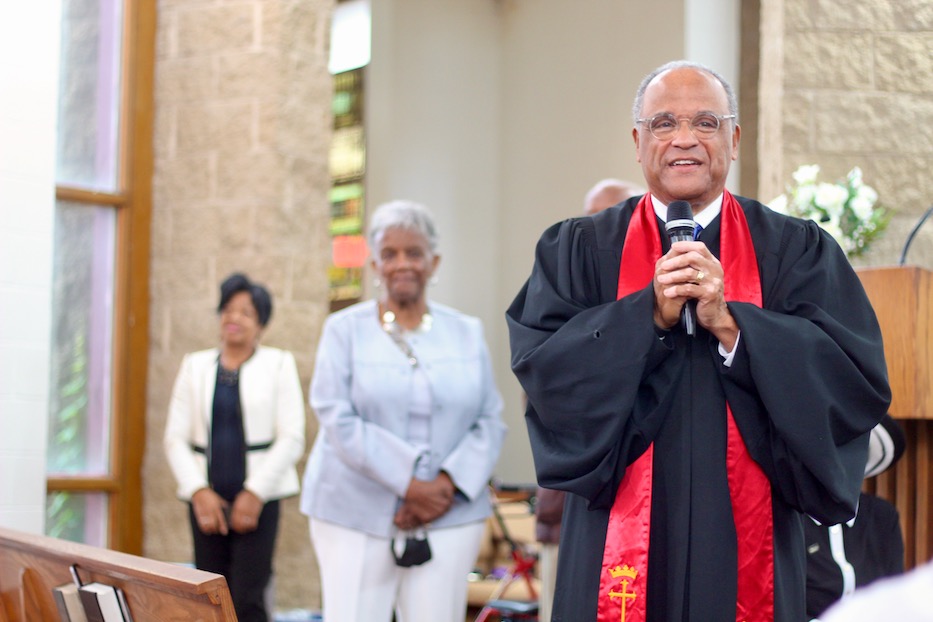
Culture & Community | Dixwell | Faith & Spirituality | Arts & Culture | News From The Pews | Arts & Anti-racism | Dixwell UCC
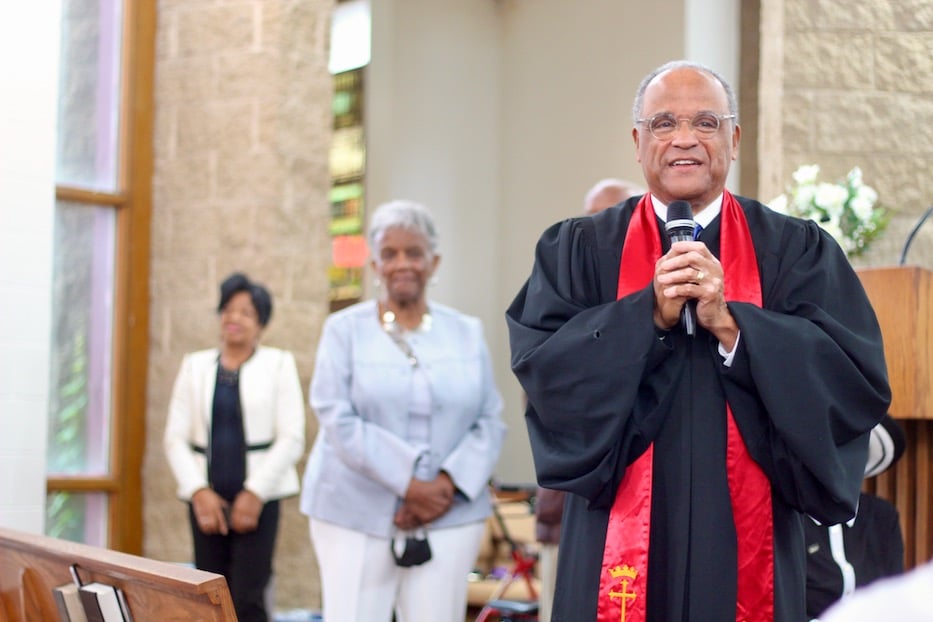
Streets on Sunday morning. Lucy Gellman Photos.
Rev. Dr. Frederick J. Streets looked out over Dixwell UCC, studying the sea of faces that smiled back at him. Behind him, a half-moon of congregants over 80 sat and stood, soaking in the moment. Before him, pint-sized parishioners made their way to the front in a rush of tiny tweed and tulle dresses and suits. The strains of "We've Come This Far By Faith" still hung low in the air. He took a deep breath.
"This is the current and future of the church," he said. In the pews, some people linked hands; others murmured back as if to say yes. And it was: even in the endless gray of a rainy fall morning, the path forward seemed bright.
Sunday, Rev. Dr. Frederick "Jerry" Streets preached his final sermon as the senior pastor at Dixwell United Congregational Church of Christ (Dixwell UCC), where he has occupied the position since October 2013 and been in relationship with the church since August 1972. This fall, he joins the Yale Divinity School (YDS) as the coordinator of its new joint degree program in Divinity and Social Work.
In a service filled with song, impassioned speeches, legislative proclamations and tear-filled memories, congregants wished him a fond and loving farewell after 11 faithful years of service.
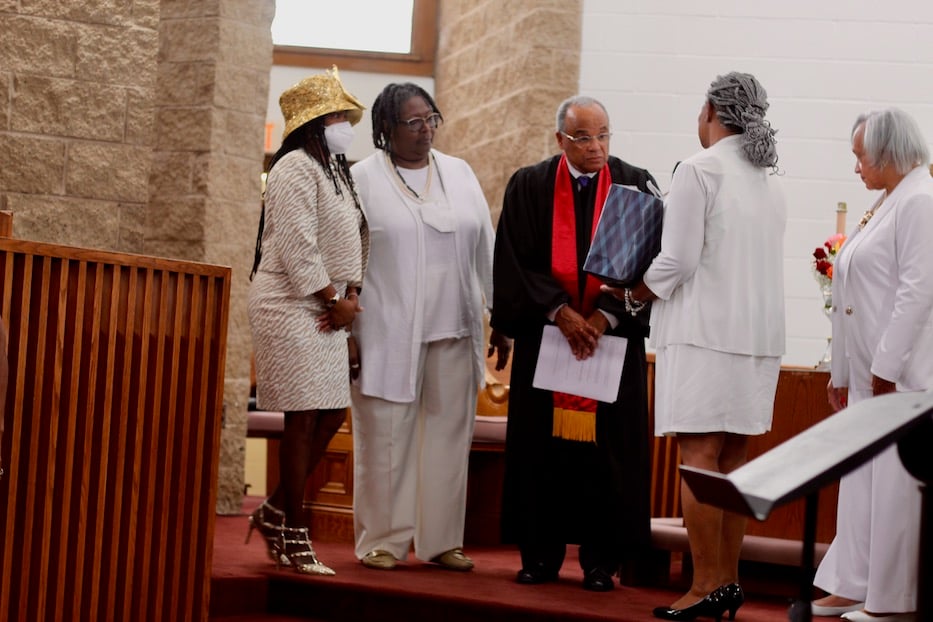
"The record of what I have done here, what I have attempted to do here, or what ways by which I have failed lies in your hands, and for your interpretation and appraisal," Streets said as he stood at the pulpit for the last time. "Today I leave you with this sermonic hug, a reflection on the hope of the gospel."
The story of Streets' relationship with Dixwell UCC, which last year celebrated over two centuries of history in New Haven, stretches out over five decades. After graduating from Ottawa University in 1972, Streets and his wife, Annette, moved to New Haven to pursue his graduate studies at the Yale Divinity School. It was August 20, 1972—the day after his wife's birthday—when he and his family walked into the church for the first time.
He never completely left. At the time, the Rev. Dr. Edwin R. Edmonds, then the pastor at Dixwell UCC, took Streets under his wing. As a graduate student, Streets served as an intern in the church, getting to know a spiritual community that aligned with his values as both a Christian and an advocate for justice. Sunday, many congregants remembered meeting him over 50 years ago for the first time, and feeling overjoyed to have him in their orbit for decades thereafter.
After graduating from YDS, Streets served as the senior pastor at Mount Aery Baptist Church in Bridgeport, and later University Chaplain and Senior Pastor of the Church of Christ in Yale. His spiritual work, and his belief that it can and should be tied to service, led him to a career in not just the clergy but also social work and education, including as a Fulbright scholar at the University of Pretoria in South Africa. Outside of New Haven, he has held positions in the Harvard Program in Refugee Trauma and at Yeshiva University in New York, and served as a fellow at the Connecticut Health Foundation.
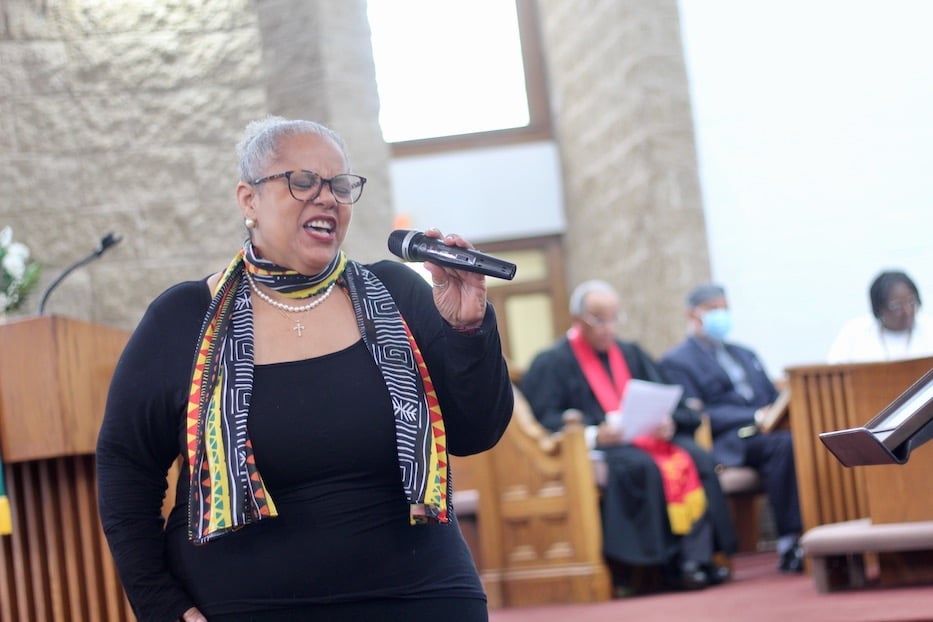
But New Haven, and specifically Dixwell UCC’s history of activism and abolition, always had a way of calling him back (he has for years also been on adjunct faculty at the Yale Divinity School). In 2011, he returned to Dixwell UCC as its acting pastor, following the retirement of Rev. Dr. John Henry Scott, III. He became the church’s senior pastor in 2013, ultimately carrying Dixwell UCC through not just the life transitions of its congregants, but the existential and spiritual crisis of the Covid-19 pandemic.
Since he began his tenure, he has worked to grow the church’s relationship with the Yale Divinity School, the Institute of Sacred Music, and the Department of Psychiatry at the Yale School of Medicine—while also welcoming new babies and children, presiding over marriages and homegoing services, and providing grief counseling and end-of-life spiritual care.
With the help of both legislators and individual members, he has secured over $3 million in aid for the church, helping sustain Dixwell UCC for its next two centuries. Last year, he and the church also spearheaded a survey and report on the wellbeing of clergy members, documenting self-care (or lack thereof) among spiritual leaders.
"There's still much work to be done to promote the mission of this church, which includes being a voice for justice in our society today," he said. "I assumed the responsibility of being your senior pastor 11 years ago and release it today with profound gratitude for the love and support of my family."
Sunday, several congregants said that they have been grateful for his guidance. Speaking during the service, Judge Clifton Graves thanked Streets for his leadership, which has remained unflagging “in the midst of crisis and controversy.” Fifty-five years ago, Graves became a member of the church when his parents first moved to New Haven from North Carolina, partly at Edmonds’ request.
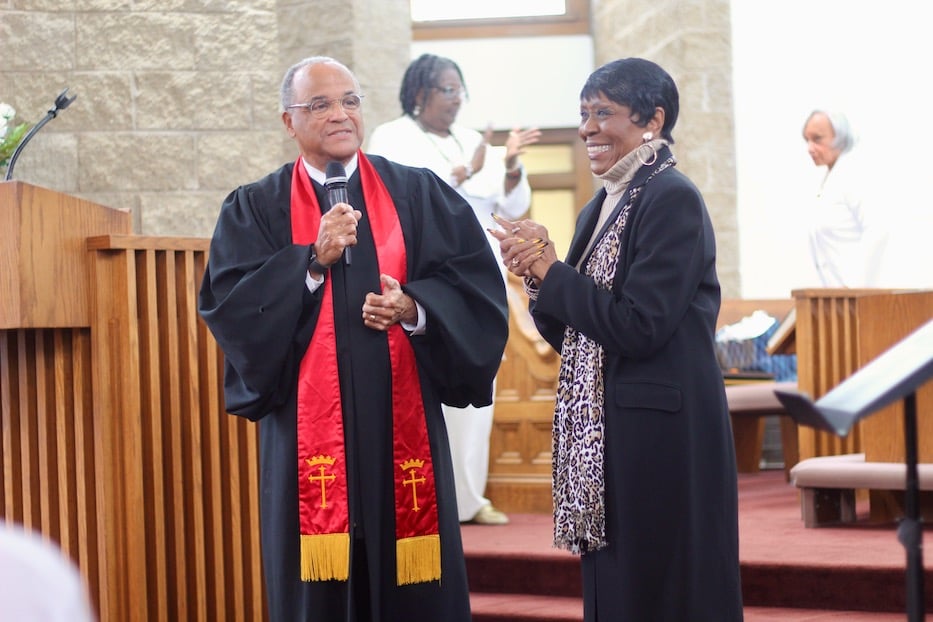
Streets and Carroll E. Brown.
For years, “this church has been very supportive,” Graves said. After his family relocated to New Haven, he met Streets in 1972. He remembered watching Edmonds wrap his arms around the then-young, bespectacled graduate student in their family home, and call Streets his son. Years later, it had felt fitting for Streets to return to the church as a spiritual leader. He remains forever grateful on a personal level, he added: when Graves’ parents passed away, it was Streets who handled their funeral services.
“We come today to say thank you,” Graves said before handing the podium over to those awarding Streets with proclamations from State Rep. Rosa DeLauro, members of the New Haven legislative delegation, and the New Haven Board of Alders.
Carroll E. Brown, founder of the West Haven Black Coalition, remembered Streets’ constant care and guidance—particularly during her own illness in 2020, and as she faced the death of her late husband, 82-year-old Ralph “Teddy” Brown, in March of this year. Three years ago, Brown remembered, she and Teddy were both hospitalized and afraid—and Streets remained a steady and calming presence.
So when Teddy became ill again this year, Brown knew who to call on. In mid-March, Streets remained in their home for hours, ultimately holding his right hand as she held his left. It was and is profound, Brown said, to watch that display of care. She added that she feels held by the entire church community, including those who have dropped off food, checked in, and offered to take her out to lunch to make sure she is eating.
“We couldn’t have found a better church family,” she said. “Reverend Streets, you are the best.”
State Rep. Toni Walker—who has lived and breathed decades of Dixwell UCC as Edmonds’ adoring daughter, and a proudly self-described PK—said that she was finding the day bittersweet. Through her dad, she met Streets 50 years ago, in the breakfast room of their New Haven home. The two have been close since.
She thanked Streets’ wife, Annette Streets, as well as his children and children in-law for their years of sacrifice and service. Then she turned back towards Streets.
“This is just one stepping stone for you, sir,” she said. “God knows what he’s doing.”
"Hope On, Dixwell!"
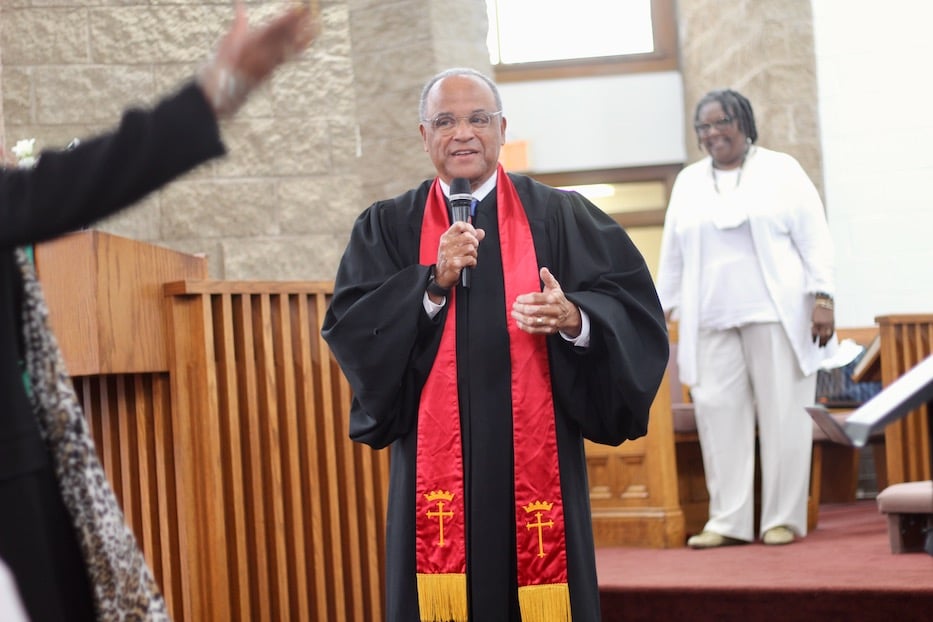
Nowhere, perhaps, was that message clearer than during Streets' sermon on “The Hope of the Gospel,” delivered in a fiery, applause- and awe-filled 30 minutes from the pulpit. From the well-loved pews, generations of congregants looked back at him, soaking in the words. Some fell to a hush; others murmured back with each line. At the front of the church, musician Markel Greene sat ready to hop on the keys if the spirit called for it.
Speaking with a soft, then soaring and poetic lilt, Streets pointed to the gospel as a source of spiritual and moral fortitude and liberation, through which those who believe in it are able to draw strength. He turned the clock back centuries, looking to how Christian teachings and gospel music helped sustain millions of enslaved Black people who were stolen from their homelands and forced into labor in what is now recognized as the U.S.
"Because of the hope of the gospel, they were undaunted by contradictions," he preached, his voice rising. "They birthed new songs from the music that was in their souls. A melodic bridge connected them with who they were, with who they would become."
He traced the power of the gospel to songwriter and pianist Thomas Dorsey, often called "the father of gospel music," to performances from the Dixie Hummingbirds and Mahalia Jackson, who stunned and moved an audience of thousands when she sang "How I Got Over" at the March on Washington in 1963. He followed it to jazz, rhythm and blues, funk and the collaborative beats and layering that built the backbone of hip hop in the 1980s.
"The hope of the gospel is that each of us experiences its power to heal and to strengthen us and to discover how we can give our lives a deep and abiding sense of purpose emotionally and spiritually," he said. By then, Greene had begun to follow along on the keys. "The hope of the gospel, Dixwell and friends, lies in its ability to give those who believe in it strength for today and hope for tomorrow. For these are the attributes of our resilience in the face of life's difficulties."
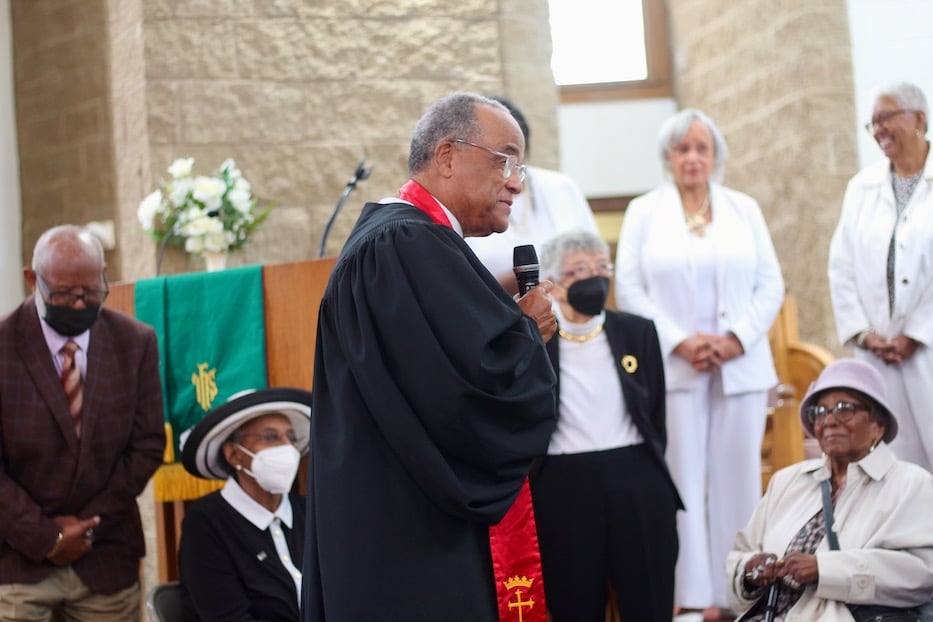
It's that same hope, he continued, that lets him know that Dixwell UCC will survive and thrive as he departs. Through December, the church will welcome a series of guest ministers, many from the Yale Divinity School. Then in January, an interim pastor will take over, as the United Church of Christ begins its search for a replacement.
"My friends, the hope of the gospel is not just for our own strength and courage," he said, his voice smooth. "It is to be active in our community and world which faces daunting and sometimes frightening challenges. Dixwell Church, this time of transition is creating a space in which something new and wonderful can be created for the glory of God."
The best, he promised the congregation, is still to come. After weeks of reflection, in which he has asked God if he is leaving the position too early or has stayed too long, he has realized that Dixwell UCC will be fine without him—just as it has with so many spiritual leaders in the past. He pointed to the leadership already embedded in the church, including a deacon board and emerging church committee.
"I leave you with the promise of our savior. I am with you, always," he said. "The Lord … the Lord … the Lord! will make a way somehow."
"My prayer as we leave this place is that our only savior so dwelled within us that we cay go forth with the light of hope in our eyes and the fire and inspiration on our lips, God's words on our tongues, God's love in our hearts," he continued, the words sailing over the congregation. "Dixwell Church, for 203 years, you have witnessed the hope of the gospel, the hope and love of God. Hope on, Dixwell! You pray for me, and I will continue to pray for you."
In the bursts of music, song and applause that followed, congregants surrounded Streets with warmth, sending him on his way with several gifts, embraces, whispered secrets and fond utterances of “thank you.” Throughout, Streets’ still-youthful smile rarely faded, filling the church with light.
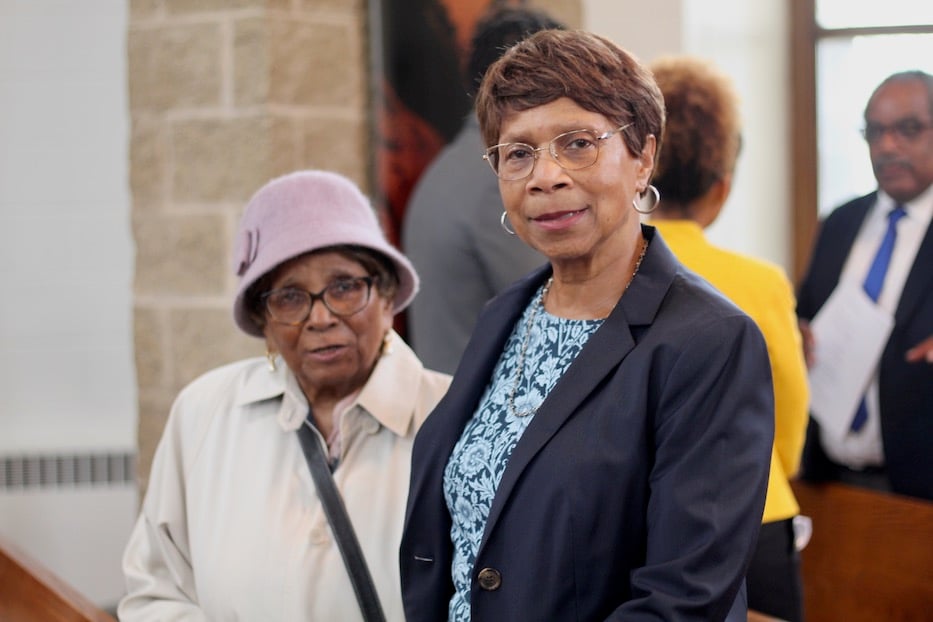
Agnes Farrar and Verna Carr.
Agnes Farrar, who turned 101 in May, said that she will miss Streets, “a wonderful person and pastor” who she’s known for roughly half of her life. Because mobility is sometimes difficult for her, she doesn’t always come to Sunday services—but wasn’t going to miss her final chance to see Streets at the pulpit.
Sunday, she attended with her daughter Verna Carr, who drives over two hours from New York to make services as often as she can. “It’s a miracle to be able to sit here,” she said.
“This is how I start my week,” Carr chimed in as she stood beside her mother. “I’m looking to be uplifted. He is going to be very, very missed”
As she made her way towards a post-service lunch in Streets’ honor, longtime member and educator Sharon Esdaile said that she too will miss Streets, who with the onset of Covid-19 carried the church through some of its most difficult years in recent history. After moving from Alabama to Connecticut in 1963, she became close with the Edmonds family, and met Streets early in his time in New Haven.
“The church has always been a center of activism and ideas and possibility, and he has a similar way of thinking,” she said. “He’s very inspirational and without limit himself.”
Watch the full service, including the sermon and comments from congregants, in the video above.

